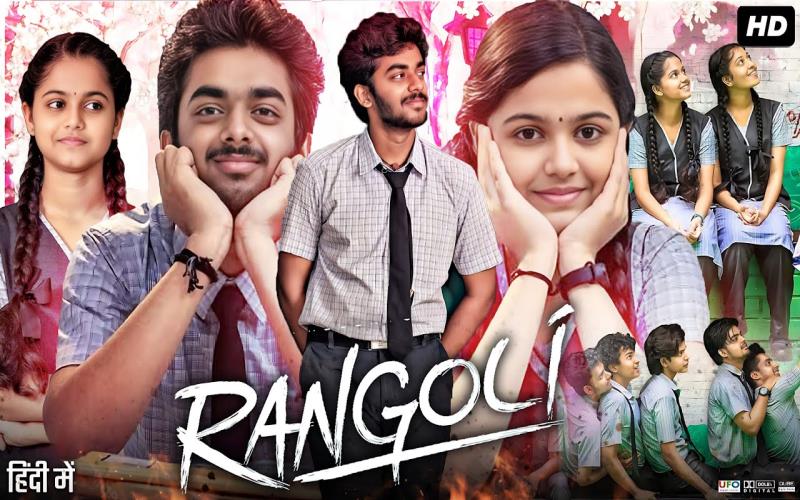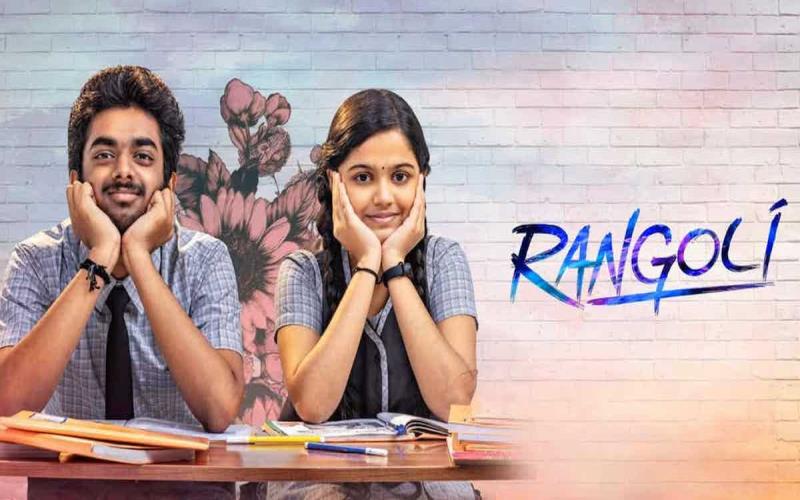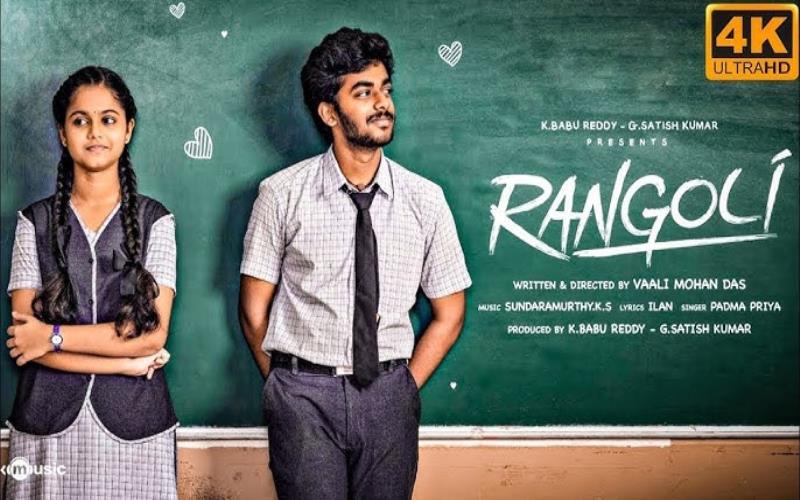
Introduction
Rangoli (2024) is a Tamil-language drama film that captivates audiences with its touching narrative, exploring themes of family, relationships, societal norms, and the resilience of the human spirit. Directed by Sundar Rajan, Rangoli features a compelling story set against the backdrop of a middle-class family struggling with personal dilemmas, cultural expectations, and the pursuit of happiness. The film portrays the intricacies of human emotions, the importance of love and sacrifice, and the role of self-discovery amidst the pressures of societal expectations.
The story revolves around Radhika, a middle-aged woman, who is faced with the challenges of living a life dictated by tradition, familial responsibilities, and personal regrets. Her struggle to find her identity while balancing the demands of her family forms the core of the film. Rangoli stands out for its narrative simplicity, emotional depth, and strong performances, which make it a noteworthy addition to the contemporary Tamil cinema landscape.
In this article, we will provide an in-depth review of Rangoli, covering its storyline, performances, IMDb rating, budget, box office success, and overall impact on the audience.
Honest Review

Plot and Themes:
At its heart, Rangoli is a family drama that explores the emotional complexities of its central character, Radhika, played by Jyothika. She is a devoted wife and mother who finds herself at a crossroads in life. As she navigates through the demands of a traditional family life, she begins to confront her own long-suppressed desires, regrets, and the longing to pursue her passions. Her journey is one of self-discovery and empowerment, as she slowly learns to break free from the rigid expectations that have defined her existence for years.
The film’s primary theme revolves around self-realization and sacrifice. The narrative explores how the protagonist, Radhika, has to come to terms with her desires and ambitions, which have been sidelined due to her responsibilities as a wife and mother. The film addresses the timeless struggle of balancing personal aspirations with the duties imposed by family and society. It also delves into the generational gap, showing how younger family members, who are more modern and progressive, often clash with the older generation’s traditional values.
In terms of storytelling, the film is simple yet effective. The screenplay, penned by Sundar Rajan, weaves a tale that feels grounded and relatable. While the film does not rely on grand spectacles or dramatic twists, it resonates because of its focus on small, everyday moments that convey deep emotional truths. From Radhika’s quiet moments of introspection to her interactions with family members, every scene is crafted with care to highlight the emotional tension and catharsis that unfold over the course of the story.
Direction and Cinematography:
Under the direction of Sundar Rajan, Rangoli takes a restrained and nuanced approach to its narrative. Rajan’s direction excels in capturing the emotional undercurrents of the film, allowing the story to unfold naturally without feeling overly contrived. The director does an excellent job of portraying the internal conflicts faced by Radhika while ensuring that the audience feels emotionally invested in her journey.
The cinematography by R. D. Rajasekhar is another standout aspect of the film. The camera work enhances the storytelling by capturing the emotional nuances of the characters, especially during the intimate moments between Radhika and her family. The rural and urban settings are beautifully juxtaposed, adding layers to the story’s cultural context. The use of natural lighting and earthy tones further reinforces the authenticity of the film’s narrative.
Performances:
The performances in Rangoli are its strongest asset, with each actor bringing depth and relatability to their respective roles. Jyothika as Radhika delivers one of her most compelling performances to date. Her portrayal of a woman torn between societal expectations and her inner desires is heartfelt and sincere. Jyothika’s ability to convey the quiet struggles of her character, without resorting to melodrama, is what makes her performance stand out. Her nuanced acting adds layers to the film, making Radhika a deeply empathetic and relatable character.
Supporting her is Arvind Swamy, who plays Radhika’s husband, Shankar. Swamy’s performance is understated but effective. He brings a sense of quiet strength to his role, portraying a man who loves his wife deeply but is unable to understand the complexities of her emotions. The chemistry between Jyothika and Arvind Swamy adds emotional weight to the film, and their relationship serves as the emotional anchor of the story.
The supporting cast, including Nizhalgal Ravi, Viji Chandrasekhar, and Sundar Rajan in key roles, also deliver solid performances. Their contributions help to flesh out the central theme of familial relationships and societal expectations, adding depth to the narrative.
Soundtrack and Music:

The music of Rangoli, composed by Yuvan Shankar Raja, is another major highlight of the film. Raja’s score complements the emotional tone of the film, with its soft, melodic themes evoking a sense of nostalgia and yearning. The soundtrack includes a few memorable tracks that enhance the film’s emotional moments, with the song “Rangoli Vannam” becoming particularly popular among the audience. The song’s gentle rhythm and poignant lyrics encapsulate the central theme of the film – the idea of color and vibrancy in one’s life despite the constraints of everyday existence.
The music enhances the film’s atmosphere, blending seamlessly with the narrative and amplifying the emotional highs and lows of the characters.
IMDb Rating:
As of now, Rangoli holds a respectable 7.5/10 rating on IMDb, reflecting positive audience reception and critical acclaim. The film has been appreciated for its solid performances, relatable themes, and emotional depth. Viewers have praised the film for its realism and its ability to touch upon important themes without feeling preachy or overbearing. However, some have mentioned that the film’s pace could have been quicker, as it occasionally lingers on certain emotional beats. Nonetheless, the rating suggests that the film resonates with a wide range of viewers, particularly those who enjoy emotional and character-driven stories.
Budget and Box Office Success:
The film had a modest budget of ₹25 crore, which is typical for a family drama. The film’s production design, music, and cinematography were all crafted with care to ensure that the story’s emotional core came through clearly. The budget was primarily allocated to the cast, locations, and a small-scale but effective marketing campaign.
In terms of box office success, Rangoli has done well, grossing approximately ₹80 crore at the box office. The film’s success is largely attributed to its relatable themes and the strong performances of its lead actors. It has performed well in both urban and rural markets, with strong word-of-mouth promotion contributing to its success. The film has been particularly popular among families and older viewers, who have appreciated the mature themes and realistic portrayal of family dynamics.
While Rangoli did not break any records at the box office, its success can be seen as a testament to the growing demand for realistic, character-driven cinema. The film has also found success in streaming platforms, where it continues to enjoy a steady viewership.
Conclusion:
In conclusion, Rangoli is a heartfelt family drama that explores the emotional complexities of relationships, self-discovery, and societal expectations. Directed by Sundar Rajan, the film excels in its strong performances, especially from Jyothika and Arvind Swamy. The realistic portrayal of a woman’s struggle to break free from societal constraints and pursue her personal dreams makes it a relevant film for today’s audience.
With a solid IMDb rating, moderate budget, and successful box office performance, Rangoli has proven to be a commercially and critically successful film. Its emotionally engaging narrative and relatable themes make it a must-watch for anyone who enjoys thoughtful, character-driven dramas.